|
56-58 New Street
Ashford
https://whatpub.com/british-volunteer
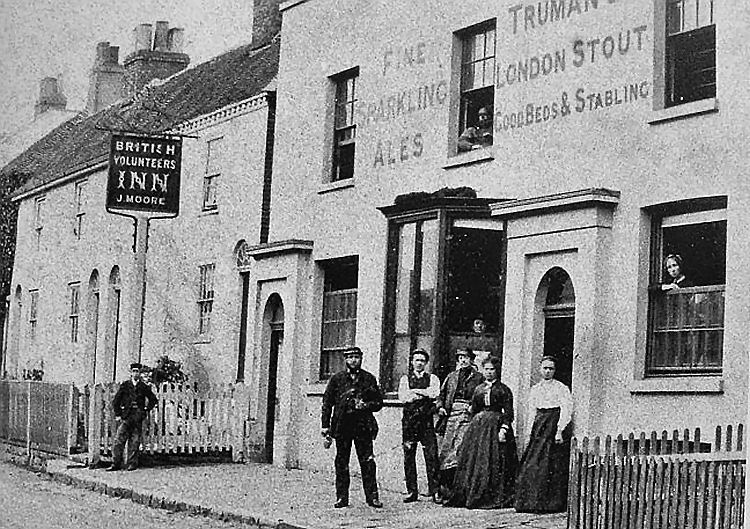
Above photo, date unknown. |
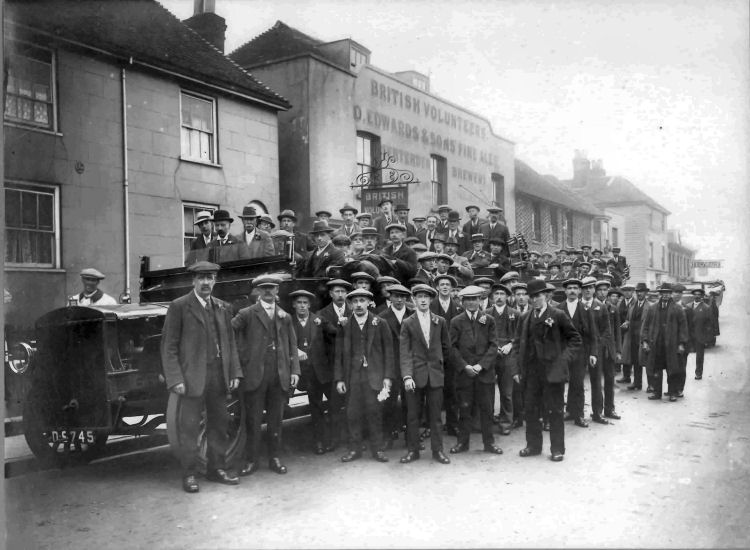
Above photo, date unknown, kindly sent by Andy Turner. |

Above photo, the same as the one above this, by kind permission
http://www.kentphotoarchive.com. |
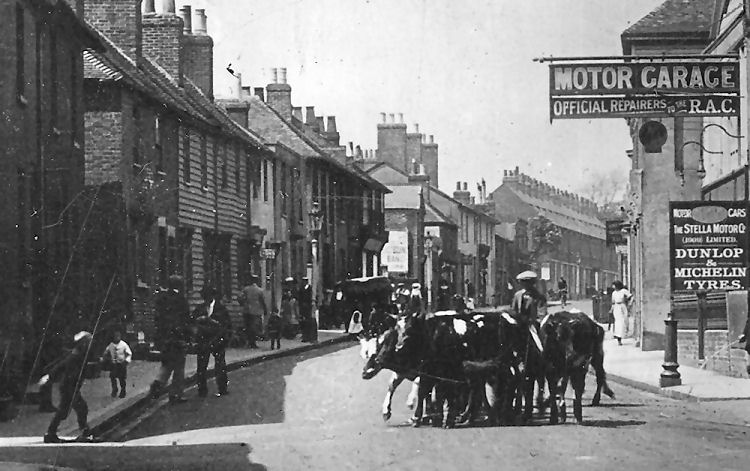
Above photo 21 August 1912 showing the sign under the MOTOR GARAGE
one. Taken from outside the "New Inn." |
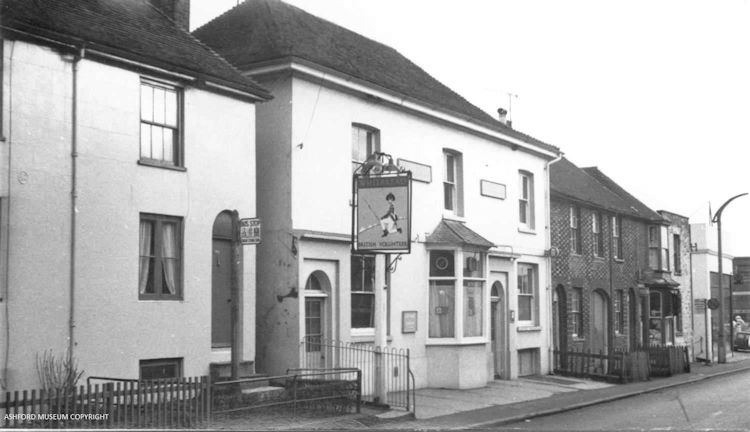
Above photo, circa 1975. |

Above photo, 17 August 1975, by Jim Ashby. |

Above photo, 24 December 1975, by Jim Ashby. |
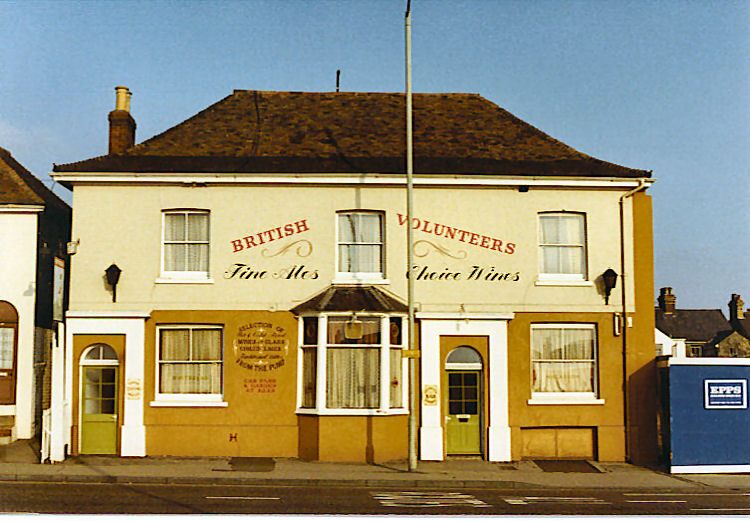
Above photo kindly sent by Chris Excell, date unknown. |

Above photo, 7 August 1988, by Jim Ashby. |
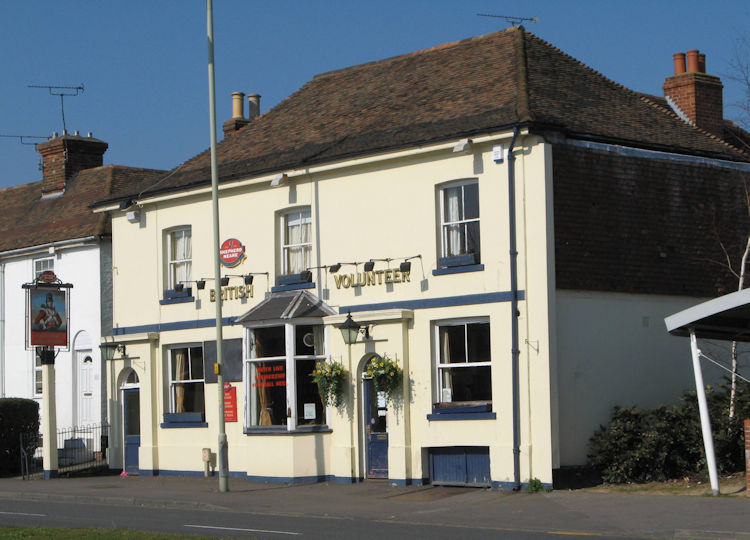
Above photo, 26 March 2007, by Jim Ashby. |
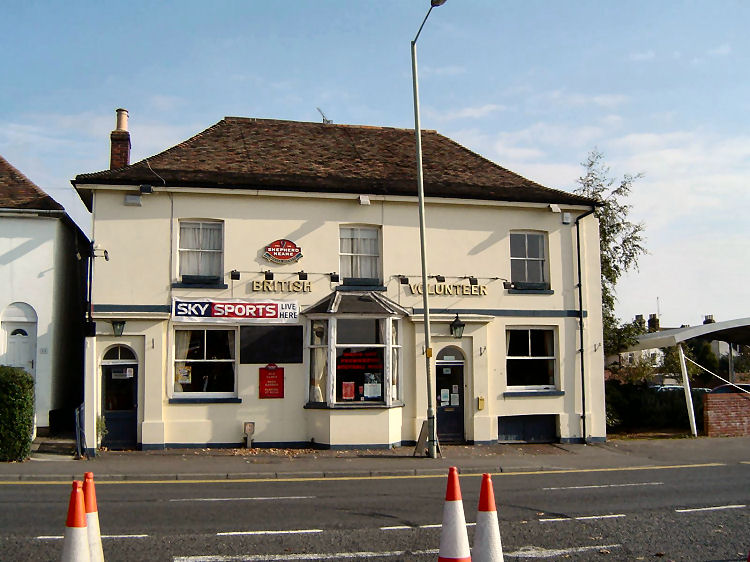
Later photo taken by Chris Excell, 2009. |
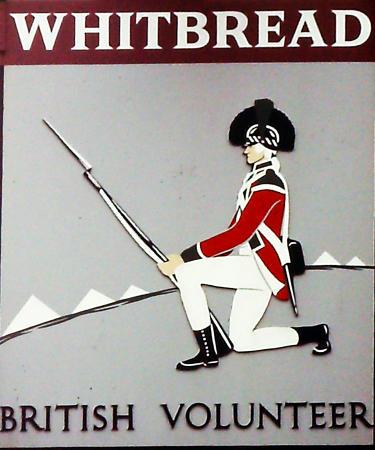
Above sign 1975.
With thanks from Roger Pester
www.innsignsociety.com.
|
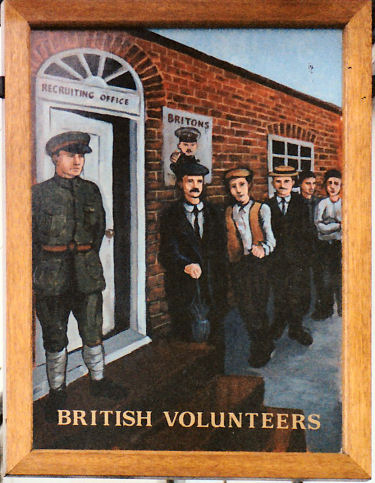 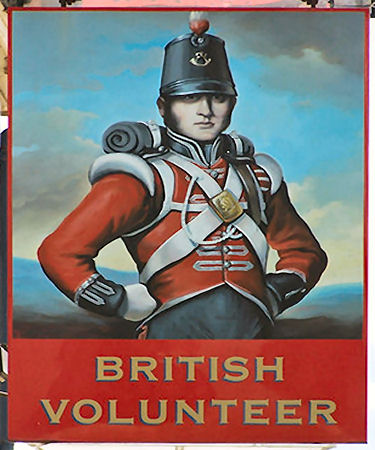
Above sign left 1991, sign right 2009. |
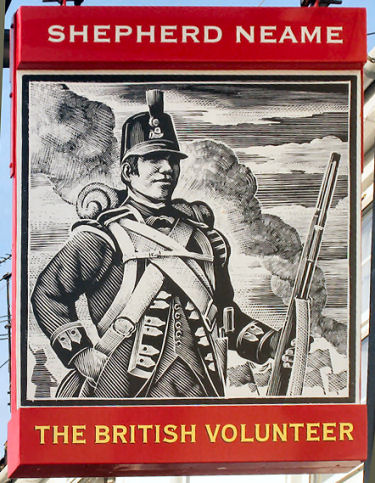
Above sign 2010. |
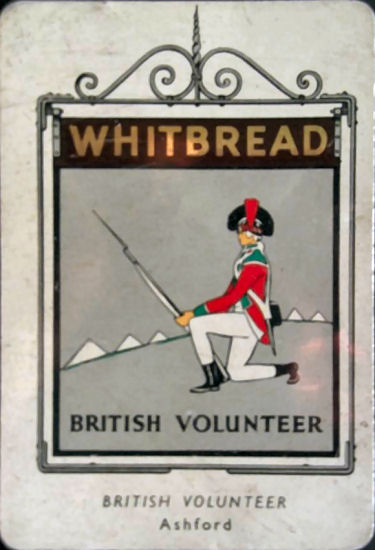 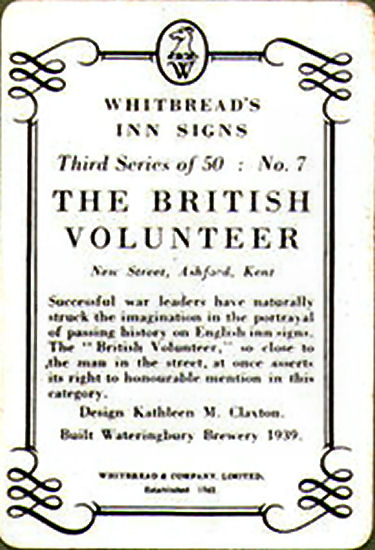
Above aluminium card issued June 1951. Sign series 3 number 7. |
|
|
Originally owned and converted from two cottages by the Army in the
1860s, after several licensees refused to serve troublesome soldiers from
the barracks opposite.
One time property of the "Tenterden
Brewery" the brewery went up for auction in February of 1922.
The premises closed circa 2015 and has now (2019) been converted into
flats.
At some time the name seems to have changed from the "British Volunteers"
to the singular "British Volunteer." Or vice-verca.
|
Faversham Mercury 19 August 1865 On Thursday
afternoon, during the cricket match between the tradesmen of the
town, which a large number of persons assembled to witness, a light
spring cart was driven on to the ground by Mr. William Hollands,
landlord of the "British Volunteers Inn," at Ashford. Mr. Hollands had
been to Folkestone, and on his way home called at the cricket ground
to see how the match was proceeding. He was accompanied by a
gamekeeper. After watching the game for some time, Mr. Hollands and
the gamekeeper got into the cart and drove the horse from the side
to the front of the tent, in and about which a large number of
persons were assembled, and in some measure blocked their view of
the game. He was requested to drive on, and there was a good deal of
what is called “chaff" bandied between him and the people.
Eventually he did drive on towards the entrance to the cricket
ground, but had not proceeded many yards when the horse stopped,
and, as neither of the two in the cart appeared quite capable of
managing the horse, Mr. Richard Banks went after them, turned the
horse and cart round, and brought them back to the front side of the
tent nearest Sandgate, with the horse facing in that direction.
“Chaff’’ was again indulged in, and some persons present, seeing Mr.
Banks at the horse’s head, for a joke told him to put the lot up by
auction. Mr. Banks then asked “Who bids for this lot?” when all on a
sudden the horse started off at a gallop towards a very steep
declivity between the martello tower and the road. Mr. V. Laker,
omnibus proprietor, of Hythe, who was on the ground on horseback,
seeing the perilous position in which the two men in the cart were
placed, at once put spurs to his horse and galloped after the cart,
succeeding in getting between it and the brow of the hill, and
turned the runaway horse in the direction of the tower, out of
immediate danger, but did not then succeed in staying its progress.
Round the tower there is an embankment, and the wheel of the cart
ran upon this, turning the horse and cart again in the direction of
the cricket tent. The horse then swerved to the left, and the two
men in the cart followed its motion, and had barely gained their
equilibrium when another sudden turn to the left threw Mr. Hollands
over the wheel on the right hand side, and he fell on the grass,
losing his hold on the reins as he fell, and just at this time Mr.
Laker succeeded in catching hold of the horse, and prevented it
doing any further damage. Assistance was immediately rendered to the
poor man who had fallen. He was examined by W. Bateman, Esq.,
surgeon, and eventually removed from the ground in another vehicle
under the care of Police sergeant Newman, and taken to the "Rose and
Crown" (sic), in Dover Street, where every attention was paid him,
but he died on the following morning.
|
|
Kentish Chronicle 19 August 1865 During the
cricket match between the tradesmen of Folkestone on Wednesday
afternoon, Mr. Hollands, landlord of the "British Volunteers Inn,"
Ashford accompanied by a gamekeeper, drove onto the ground in a
light spring cart. As they got in front of the tent they were
requested to move away, and eventually drove towards the entrance to
the ground. They had not proceeded far when the horse stopped, and
as the occupants of the cart did not appear capable of managing the
horse, Mr. Richard Banks went after them, turned the horse and cart
around, and brought them back to the front side of the tent, nearest Sandgate, with the horse facing in that direction. Some persons
present, seeing Mr. Banks at the horse's head, jokingly told him to
put the lot up by auction. Mr. Banks then asked “Who bids for this
lot?” when all on a sudden the horse started off at a gallop towards
a very steep declivity between the martello tower and the road. Mr.
V. Laker, omnibus proprietor, of Hythe, who was on the ground on
horseback, at once galloped after the cart, succeeding in getting
between it and the brow of the hill, and turned the runaway horse in
the direction of the tower, out of immediate danger, but did not
then succeed in staying its progress. Round the tower there is an
embankment, and the wheel of the cart ran upon this, turning the
horse and cart again in the direction of the cricket tent. The horse
then swerved to the left, and the two men in the cart followed its
motion, and had barely gained their equilibrium when another sudden
turn to the left threw Mr. Hollands over the wheel on the right hand
side, and he fell on the grass, losing his hold on the reins as he
fell, and just at this time Mr. Laker succeeded in catching hold of
the horse, and prevented it doing any further damage. Assistance was
immediately rendered to the poor man who had fallen. He was
examined by W. Bateman, Esq., surgeon, and eventually removed from
the ground in another vehicle under the care of Police sergeant
Newman, and taken to the "Rose and Crown" (sic), in Dover Street,
where every attention was paid him, but he died on the following
morning.
An inquest was held on the body of the deceased, on Thursday,
before J. Minter Esq., coroner, when Mr. Bateman ascribed the cause
of death to the excited state of the deceased, and the shock of the
fall, which caused the rupture of a blood vessel on the brain. A
verdict of “Accidental Death” was returned. Deceased was a native of
Sutton Valence.
|
|
Canterbury Weekly Journal 19 August 1865
On Wednesday afternoon, during the cricket match between the
tradesmen of the town, which a large number of persons assembled to
witness, a light spring cart was driven on to the ground by Mr.
William Hollands, landlord of the "British Volunteers Inn," at
Ashford. Mr. Hollands had been to Folkestone, and on his way home
called at the cricket ground to see how the match was proceeding. He
was accompanied by a gamekeeper. After watching the game for some
time, Mr. Hollands and the gamekeeper got into the cart and drove
the horse from the side to the front of the tent, in and about which
a large number of persons were assembled, and in some measure
blocked their view of the game. He was requested to drive on, and
there was a good deal of what is called “chaff" bandied between him
and the people. Eventually he did drive on towards the entrance to
the cricket ground, but had not proceeded many yards when the horse
stopped, and, as neither of the two in the cart appeared quite
capable of managing the horse, Mr. Richard Banks went after them,
turned the horse and cart round, and brought them back to the front
side of the tent nearest Sandgate, with the horse facing in that
direction. “Chaff’’ was again indulged in, and some persons present,
seeing Mr. Banks at the horse’s head, for a joke told him to put the
lot up by auction. Mr. Banks then asked “Who bids for this lot?”
when all on a sudden the horse started off at a gallop towards a
very steep declivity between the martello tower and the road. Mr. V.
Laker, omnibus proprietor, of Hythe, who was on the ground on
horseback, seeing the perilous position in which the two men in the
cart were placed, at once put spurs to his horse and galloped after
the cart, succeeding in getting between it and the brow of the hill,
and turned the runaway horse in the direction of the tower, out of
immediate danger, but did not then succeed in staying its progress.
Round the tower there is an embankment, and the wheel of the cart
ran upon this, turning the horse and cart again in the direction of
the cricket tent. The horse then swerved to the left, and the two
men in the cart followed its motion, and had barely gained their
equilibrium when another sudden turn to the left threw Mr. Hollands
over the wheel on the right hand side, and he fell on the grass,
losing his hold on the reins as he fell, and just at this time Mr.
Laker succeeded in catching hold of the horse, and prevented it
doing any further damage. Assistance was immediately rendered to the
poor man who had fallen. He was examined by W. Bateman, Esq.,
surgeon, and eventually removed from the ground in another vehicle
under the care of Police sergeant Newman, and taken to the "Rose and
Crown", in Dover Street, (sic) where every attention was paid him,
but he died on the following morning.
|
|
Whitstable Times and Herne Bay Herald, 26 March 1870.
Kentish Gazette, 22 March, 1870.
SHOCKING OCCURANCE.
On Friday afternoon an inquest was held at the "British Volunteers Inn,"
New Street, touching the death of a young woman, aged 24 years, named
Sarah Sutton Hill, the daughter of Mr. William Hill, millwright, who
committed suicide under very distressing circumstances. The deceased, we
hear, came down as usual early on Tuesday morning and began making
preparations for breakfast. She seems then to have gone upstairs and
with a sharp pocket knife belonging to her brother cut her throat in a
very determined manner, making two severe wounds, besides stabbing
herself in the side. She appears to have made no noise, and her father
coming home about half-past seven o'clock went upstairs and found her
bleeding, with the knife clasped in her hand. G. F. Wilks, Esq.,
surgeon, sewed up the wound, but she sunk and died on Thursday. Mr. A.
Hart was chosen foreman of the Jury, and after viewing the body, the
following evidence was taken:—
Mr. William Hill, father of the deceased, who seemed overwhelmed with
grief, deposed:— On Tuesday morning last I found my daughter in her
brother’s bedroom with her throat cut. She died yesterday morning from
the injury. She had been strange at times for some period: I think I may
say for some few years; she had the gastric fever, and I think it left
an aberration of intellect behind.
By the Jury:— She had been worse for the last three or four weeks. I have
heard that on Monday night she went down the street wearing my boots. We
have tried since the act was committed to get from her why she did it,
but she could give no reason. She has never said anything which would
lead us to think she would commit suicide. I found this penknife in her
hand when I discovered her.
The brother of the deceased was about to be examined but Mr. A.
Williams, one of the jury, said he did not think it necessary to hear
any further evidence.
One or two jurymen said they had not heard
anything as to how the death was caused, and suggested that the medical
gentleman should be sent for; but the Coroner observed there could not
be a doubt the poor girl took her own life in a state of insanity, and a
verdict to that effect was accordingly returned.
|
|
Kentish Gazette, 11 January 1876.
SECOND COURT. STEALING FOWLS.
Before C. J. Plumptry, Esq., (in the chair); Captain Hilton, J. J.
Harvey, K. W. Wilkie, and F. W. Curteis, Esqs.
Edward Swaffer, alias "Navvy" Swaffer, and Walter Swaffer,
labourers, were charged with stealing fourteen live tame fowls,
value £10, the property of Owen Russell and Charles Edward Andrews,
at Kingsnorth, on the 14th November.
Mr. Deering prosecuted, and Mr. Ormerod defended.
Owen Russell, one of the prosecutors deposed that he and his
brother-in-law (the other prosecutor) kept fowls in a lodge at
Kingsnorth. On Sunday, 14th November, there were 23 fowls in the
lodge. They were then safe, and the lodge was secured with a padlock.
On the following morning when he visited the lodge, he discovered
that it had been broken open, and there were fourteen birds missing.
The police showed him twelve fowls and he identified several of
them. He was certain four out of the game cocks were his.
Charles Cooms stated that he was a labourer and employed by the last
witness's brother-in-law (the prosecutor Andrews). The two
prosecutors kept fowls in a lodge at Kingsnorth and he attended to
them. When he went to the lodge on Monday morning, the 15th November,
he found that there were several missing. The padlock had been broken
off and was lying on the ground. He was shown several fowls at the
police-court and identified five or six of them as belonging to the
prosecutors.
Felix Giles, landlord of the
"British Volunteer Inn," Ashford, said
that on Sunday evening, the 14th November, the two prisoners came
into his house. The prisoner Walter asked witness if he bought fowls,
and he replied that he did not. He then asked him (witness) if he
would give him 12s. for twelve fowls, which he declined to do;
prisoner then offered them to him for 10s. 6d., and which offer he
also declined. Both prisoners had a bag in their hands, and he
noticed that they looked rather bulky. The other prisoner (Edward)
did not say anything. The prisoner Walter asked the way out the
back, and he showed both prisoners into his yard.
John Bird, plumber, living at Ashford, gave evidence to the effect
that he was in the "Old English Gentleman" public house at Ashford,
on the Sunday evening. he was standing at the bar and the prisoner
Walter beckoned him to come into a room. He went and the prisoner then
took a white fowl out of a bag and showed it to witness. He was
looking at it when a policeman came in and took possession of it.
Thomas Mills deposed that he was a police-constable residing at
Ashford. On the evening of the 14th inst. (Sunday) he went into the
"Old English Gentleman" public house; he was the prisoner Walter
sitting on a seat in the front room/The last witness was standing
near the prisoner and had a fowl in his hand. There was a bag lying
on the seat near the prisoner, in which he found a fowl which the
prisoner said was his property. he told the prisoner he did not
believe him, and should take him into custody on a charge of
stealing them. On taking him to the police station the prisoner said
he bought the fowls of a man up the street. On Monday, the 15th
November, he went into the garden at the back of the
"British
Volunteer" public house, and found a bag containing either fowls
near a faggot stack. The fowls were the same that had been
identified by the witness Cooms and Russell. On the same day he
visited the lodge at Kingsnorth, and noticed footprints on the
ground leading to and from the lodge.
Police constable Lane, of Ashford, proved going to the prosecutors'
premises on the 15h November, and discovering some footprints near
the lodge, he obtained the prisoner Walter's boots, and upon
comparing the shoes with the footprints found them to correspond. He
cut out the footprints, but they had since fallen to pieces. He also
corroborated the last witness as to finding the bag at the back of
the "British Volunteer."
Mr. Ormerod, in an able address for the
prisoners, contended that
there was not the slightest evidence against Edward Swaffer, and
argued that although the evidence was stronger against the other
prisoner it was not sufficient to convict upon.
The Jury, after some
consultation acquitted Edward Swaffer, and
found the prisoner Walter, "Guilty."
A sentence of six months' had labour was inflicted.
|
LICENSEE LIST
SKINNER Thomas 1871+ (age 28 in 1871 ) )
RICHARDS Lewis 1874+
GILES Felix 1876+
SHARP Thomas 1881-82+
 (also painter age 48 in 1881 (also painter age 48 in 1881 ) )
PELLATT Roland 1891+ (widower age 37 in 1891 ) )
MOORE J ????
FOULGER Frederick William 1901-22+ (age 60 in 1911 ) )

LASHAM Thomas George 1930+
WATERMAN John 1938+
https://pubwiki.co.uk/BritishVolunteer.shtml
 From the Kelly's Directory 1903 From the Kelly's Directory 1903
 Census Census
|
















